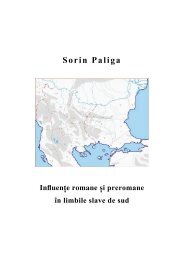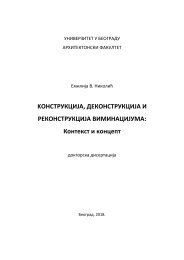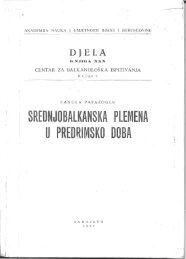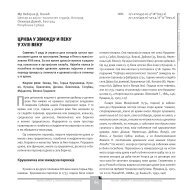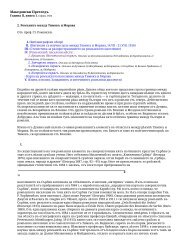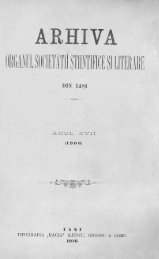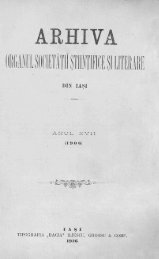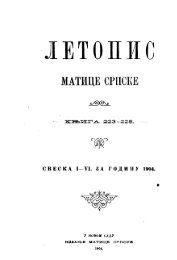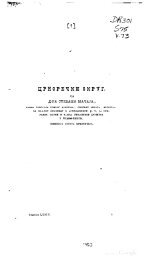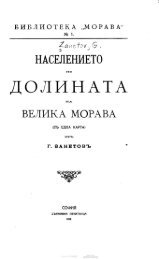The Construction of National Identity and its Challenges in Post-Yugoslav Censuses
You also want an ePaper? Increase the reach of your titles
YUMPU automatically turns print PDFs into web optimized ePapers that Google loves.
890 Social Science Quarterly<br />
addition, the Bosniak “identity package” is more challeng<strong>in</strong>g, as the language associated<br />
with community, “Bosnian,” is contested <strong>and</strong> also a product <strong>of</strong> the dissolution <strong>of</strong> Serbo-<br />
Croatian. Bosnian speakers, therefore, may opt for three alternatives: Serbian, Croatian, or<br />
Montenegr<strong>in</strong>.<br />
F<strong>in</strong>ally, the boundary between Bosnian <strong>and</strong> Bosniak identity rema<strong>in</strong>s fluid <strong>and</strong> untested.<br />
<strong>The</strong> identification with the state (Bosnian) rather than an ethnic group was not option <strong>in</strong><br />
the 2013 census, but could be chosen as a “write-<strong>in</strong>” option. This option was the success<br />
<strong>of</strong> a coalition <strong>of</strong> NGOs called “Be a citizen” (Budi građan<strong>in</strong>/ka) that campaigned, for this<br />
(Perry, 2013:12–14). <strong>The</strong>y also encouraged citizens to identify as Bosnian to challenge the<br />
prevail<strong>in</strong>g ethno-nationalist stratification <strong>of</strong> society. In this sense, Bosnia is an exception,<br />
as identification with the state does not imply a particular ethno-national identity. Selfidentification<br />
as Croat, Serb, Macedonian, or Montenegr<strong>in</strong> cannot be a marker <strong>of</strong> national<br />
identity l<strong>in</strong>ked solely to the state <strong>and</strong> devoid <strong>of</strong> ethno-national connotations. Only Kosovo<br />
<strong>and</strong> Bosnia theoretically provide the possibility to separate identification with the state <strong>and</strong><br />
the ethno-national community. However, the reality <strong>of</strong> this is quite different. In both cases,<br />
the state is identified more strongly with a particular community, Albanians for Kosovo<br />
<strong>and</strong> Bosniaks for Bosnia. 5<br />
Ethnic entrepreneurs promot<strong>in</strong>g Bosniak identity, led by the Islamic Community, the<br />
Party <strong>of</strong> Democratic Action (the ma<strong>in</strong> Bosniak ethnonational party), <strong>and</strong> a coalition called<br />
“It is important to be Bosniak” (Bitno je biti Bošnjak), sought to discredit both Muslim <strong>and</strong><br />
Bosnian identity categories. <strong>The</strong> Muslim option was dismissed as unnatural (i.e., confus<strong>in</strong>g<br />
religion <strong>and</strong> national identity), <strong>and</strong> the Bosnian identity was attacked by these groups for<br />
be<strong>in</strong>g “fake,” <strong>and</strong> the groups accused <strong>in</strong>tellectuals <strong>and</strong> NGOs lobby<strong>in</strong>g for Bosnian identity<br />
<strong>of</strong> cont<strong>in</strong>u<strong>in</strong>g the wartime violence aga<strong>in</strong>st Bosniaks (Armakolas <strong>and</strong> Maksimovic, 2014).<br />
Next to discredit<strong>in</strong>g alternative identity categories, census campaigns have been marked<br />
by an effort <strong>of</strong> ethnic entrepreneurs to re<strong>in</strong>force the “identity package” that is construed<br />
<strong>in</strong> the census forms, explicitly or implicitly, to jo<strong>in</strong>tly form national identity. This was<br />
particularly pronounced <strong>in</strong> cases where citizens had alternatives easily available. This <strong>in</strong>cludes<br />
particularly speakers <strong>of</strong> Croatian, Serbian, Bosnian, <strong>and</strong> Montenegr<strong>in</strong> who are able<br />
to switch among the four languages, amidst the fluid national identity markers, as noted<br />
above <strong>and</strong> between religious <strong>and</strong> nonreligious categories. For example, <strong>in</strong> a one-page advertisement<br />
<strong>in</strong> the Bosnian daily, Dnevni Avaz, the well-known <strong>in</strong>tellectual, Muhamed<br />
Filipović, implored Bosniaks “that we have to be consistent <strong>and</strong> declare accord<strong>in</strong>g to the<br />
historical truth <strong>and</strong> rights <strong>of</strong> our people <strong>and</strong> that <strong>in</strong> regard to our ethnic <strong>and</strong> national<br />
belong<strong>in</strong>g as Bosniaks; <strong>in</strong> regard to our religion as members <strong>of</strong> the Islamic faith; <strong>in</strong> regard<br />
to our mother tongue which we all share as speakers <strong>of</strong> Bosnian” (Dnevni Avaz, 2013).<br />
Similar calls were made by Croat m<strong>in</strong>ority organizations (YouTube, 2011a), <strong>and</strong> Islamic<br />
religious leaders <strong>in</strong> Bosnia, Serbia, <strong>and</strong> Montenegro (Imamović, 2012; YouTube, 2011c),<br />
leaders <strong>of</strong> the Serbian Orthodox Church (Vesti, 2011), <strong>and</strong> religious <strong>in</strong>stitutions, NGOs,<br />
political parties, <strong>and</strong> m<strong>in</strong>ority organizations.<br />
In conclusion, campaign<strong>in</strong>g <strong>and</strong> mobilization dur<strong>in</strong>g the census was more extensive <strong>in</strong><br />
countries with more fluid identities, where advertisements, billboards, <strong>and</strong> videos sought<br />
to encourage identification with one particular ethno-national group or another, <strong>and</strong><br />
stressed adherence to coherent identity packages. Countries with rigid l<strong>in</strong>es <strong>of</strong> division,<br />
such as Kosovo, witnessed considerably less competition <strong>and</strong> campaign<strong>in</strong>g, as there is less<br />
possibility to blur identity l<strong>in</strong>es <strong>and</strong> the identity packages are more clearly def<strong>in</strong>ed.<br />
5 A total <strong>of</strong> 2,352 citizens <strong>of</strong> Kosovo opted for “Other” <strong>in</strong> the ethnic/cultural background category that also<br />
<strong>in</strong>cludes Kosovars. Results on ethnic self-identification <strong>of</strong> the Bosnian census have not been released by the<br />
completion <strong>of</strong> this article.






